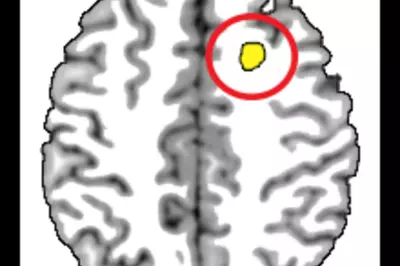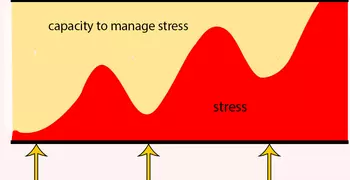How Does Mindfulness Work?

The evidence is in—mindfulness is linked to changes both in the brain and the body’s production of hormones and other chemicals that impact our physical health. Scientists postulate that the development of mindfulness leads to non-judgmental and non-reactive acceptance of experience, which is associated with positive psychological and physical outcomes.
How does mindfulness change the brain?
There is now a significant body of research documenting changes in the brain associated with the practice of mindfulness.
A 2014 review of brain imaging studies found eight brain regions consistently altered in meditators, including areas important for:
- Self-awareness of thoughts and emotions (frontopolar cortex/BA 10)
- Body awareness (sensory cortices and insula)
- Memory (hippocampus)
- Self and emotion regulation (anterior and mid cingulate; orbitofrontal cortex)
- Communication between parts of the brain (superior longitudinal fasciculus; corpus callosum).
Imaging studies consistent with other research
The brain imaging studies are consistent with research that tracks the participants’ perceptions of how they have changed, as well as research that looks at their behaviors or physiological measures, such as brain wave activity or stress hormones.
Quick summary
There is a diverse body of research that consistently associates mindfulness with certain changes in the structure and function of the brain, as well as changes in behavior.
This suggests that mindfulness can have a positive effect on our thoughts and feelings, including reducing fear and pain.
Mindfulness may lessen emotional experience of pain
Another change in the brain impacts how we experience pain. Meditators have much less activity in regions of the brain that appraise sensation and emotion. And in these meditators, the region of the brain associated with unpleasantness of pain is less connected than normal to the prefrontal cortex (where emotions are processed).
This suggests that that mindfulness may lessen the emotional experience of pain.
Mindfulness may lessen fearful responses
Using brain imaging tools, such as fMRI, scientists have shown that the threat response, which begins in a region of the brain known as the amygdala, is calmed in meditators. Researchers at Stanford and Harvard have found that meditation reduces the density of neurons and hence the activity in the amygdala and increases neuron density in the prefrontal cortex, which is an important area for regulating emotions. In essence, the reactive fear center of the brain shrinks and the more thoughtful response center of the brain grows.
In addition, mindfulness is associated with changes in connections between regions in the brain. Specifically, the connections between the fear-responsive amygdala and rest of the brain weaken, while those between the emotionally-regulating prefrontal cortex and rest of the brain are strengthened. In all, these changes suggest that mindfulness lessens reactive and fearful responses and enhances thoughtful appraisal of events.

Reduce fear with mindful relaxation
With a little practice, you can learn how to shift into a relaxation mode.
Reduce Fear with Mindful Relaxation
Mindful relaxation is an effective way to combat stress and work with fear and anxiety. When done successfully, the relaxation response increases alpha brain wave activity and lowers blood pressure, pulse, respiration rate, metabolic rate, oxygen consumption, anxiety, and produces a greater sense of wellbeing.
Over time, you will develop an ability to shift into a more relaxed state in the midst of stressful situations.
Try these steps to help you achieve mindful relaxation:
- Commit to an uninterrupted length of time each day to do your practice. You might begin with five minutes and increase from there. Twenty minutes of relaxation once or twice a day is optimal.
- Choose a quiet place. Turn off the television, radio, computer, and telephone.
- Find a comfortable body position. You can sit or recline in a chair, or settle comfortably on the floor. Make sure you feel supported.
- Focus on the repetition of a word, sound, prayer, or your breath flowing in and out.
- Create a positive state of mind. While you may not always be able to block out worries or negative thoughts, you don't need to attach to them. Let them float by like clouds in the sky.

How does mindfulness change the body?
Mindfulness can induce the relaxation response. This response engages the parasympathetic nervous system, which is responsible for restoring the body to base levels after a stress response, calming it down by lowering the heart and respiratory rate, blood pressure, and muscle tension. Mindfulness is also associated with a reduction in other physical symptoms of stress, such as markers like C-reactive proteins, interleukin 6, and cortisol. This reduction is greatly desirable, because physical symptoms of persistent stress are associated with an increased risk of serious diseases such as high blood pressure, heart irregularities, insomnia, persistent fatigue, digestive disorders, mental health issues, diminished fertility, and diabetes.
Some mindfulness techniques may impact the body differently
There is some interesting research that different mindfulness techniques, for example observing thoughts as opposed to focusing on breathing, have different effects on the body. Several studies have found that observing thoughts creates more arousal than focusing on breathing. Thus, in later sections, we suggest different meditations for different goals.
Practices to try

Dealing with difficult emotions or sensations
Use this meditation from UCLA to work with difficult emotions, such as fear or body sensations, such as pain.

Thoughts and emotions meditation
Try this guided meditation to work with thoughts and emotions.
Chiesa, A., Serretti, A. (2010). A systematic review of neurobiological and clinical features of mindfulness meditations. Psychological Medicine; 40(8), 1239–1252.
Fox, K.C., Nijeboer, S., Dixon, M.L., Floman, J.L., Ellamil, M., Rumak, S.P., et al. (June 2014). Is meditation associated with altered brain structure? A systematic review and meta-analysis of morphometric neuroimaging in meditation practitioners. Neuroscience & Biobehavioral Reviews; 43, 48–73.
Goldin, P., Gross, J. (2010). Effects of mindfulness-based stress reduction (MBSR) on emotion regulation in social anxiety disorder. Emotion; 10(1), 83-91.
Grant, J.A., Courtemanche, J., Duerden, E.G., Duncan, G.H., Rainville, P. (2010). Cortical thickness and pain sensitivity in Zen meditators. Emotion; 10(1), 43–53.
Hölzel, B., Carmody, J., Vangel, M., Congleton, C., Yerramsetti, S., Gard, T. & Lazar, S. (2011). Mindfulness practice leads to increases in regional brain gray matter density. Neuroimaging; 191, 36-43.
Lumma, A., Tok, B., Singer, T. (2105). Is meditation always relaxing? Investigating heart rate, heart rate variability, experienced effort and likeability during training of three types of meditation. International Journal of Psychophysiology; 97, 38–45
















